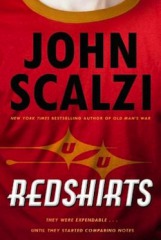
TAC Reviews...Redshirts
Date Posted: 10/08/18
Originally published in 2012 Redshirts was written John Scalzi and takes place in a Star Trek-type universe that not surprisingly features a huge casualty rate in the lower ranks of those serving onboard the Intrepid, the flagship of the Universal Union.
The concept of this book was one that immediately appealed to me and it actually came to my attention when Abbie bought it for me, not because it was my lifecycle anniversary or any special occasion but just because she saw it and thought I might like it. This has been the first book in ages that I read in about four sessions, reading 70-80 pages in one go, and often continuing to read after telling myself that I would stop.
I am jumping ahead yet again so first let me give you the gist on what is happening...
The novel opens with a “redshirt” being killed on an away mission by giant sand worms and the surviving senior officers onboard the Intrepid lament on the unusually high amount of lower ranking officers that die in the line of duty. However, they conclude that space exploration is inherently dangerous so decide that they need more officers.
Whilst docked at a space port the Intrepid takes on five new crew members: Ensign Andrew Dahl, Ensign Maia Duvall, Ensign Jimmy Hanson, Ensign Jasper Hester and Ensign Finn. In his new position in the xenobiology department Dahl discovers that his fellow crewmembers are extremely phobic of being around senior officers. They avoid the bridge crew at all costs and never volunteer to go on any away missions, choosing instead to hide away in their lab, making themselves scarce whenever an officer stops by.
The five new ensigns start to hear rumours that any low ranking officer that goes on an away mission is going to die, the theories for the high mortality rates of crew members include incompetence from senior officers, superstition, cosmic forces and even the belief that each mission requires a “sacrifice” so that others can survive.
Dahl realises that before five years ago the Intrepid didn’t have any higher a mortality rate than any other ship in the Universal Union fleet, but in the last few years its death rates have spiked dramatically. But no one in authority seems to notice. For a lower ranking officer being assigned to the Intrepid and joining an away team is effectively a death sentence so ensigns try to stay hidden or get transferred off the ship as soon as possible.
After having numerous close calls on missions Dahl meets Jenkins, a man that lives completely off the ship’s grid, and exists almost as a phantom who never brings himself to the attention of the senior staff and also seems to have been forgotten.
He informs Dahl and his friends that he believes that their reality is somehow being influences by a past fictional television show (...yeah I know...) and they are all victims of “the Narrative” which robs them of their free will forcing them to behave in a way that may be completely out of character for them. As a television show is influencing their reality it explains why good officers make incompetent decisions, ensigns make bad calls, and the ship has mysterious technology onboard which is always able to create medicines or solutions to problems that would otherwise be impossible to create. Dahl and his friends each have enough of a back story to create emotional impacts when they die.
Naturally the ensigns are sceptical of Jenkins’ explanations into what is happening but they start to wonder if he is right. One of the senior officers, Astrogator Anatoly Kerensky is almost always injured whilst on away missions but no matter what happens to him a cure is found or his injuries healed so he can be back on his feet in hours. He is also having a sexual relationship with Duvall which she is quite casual about, but it is implied he might be more attached to her, therefore if she were to sudden die then it would carry more poignancy for Kerensky.
Jenkins offers them a solution to their problem which involves travelling back in time and getting the makers of their “show” to stop producing it. If that happens things should go back to how they were five years previously because that is before the Narrative took over and started killing off crew members.
Kidnapping Kerensky, because without him the five “extras” would die in their time-travel attempt Dahl and Co do travel back into the early 2010s. However, meeting their creators and convincing them to stop production on a successful show proves to be a little more complicated than they initially thought...
Now when I sat down to read this book I figured it would be basically a piss take of Star Trek, and even Galaxy Quest. One of the characters in that film points out that basically he was only on the show to die, he is the one who gets killed to prove the situation is desperate, and revolving an entire story around characters that seem to exist to die was genius. I remember watching an episode of The Next Generation in which Picard, Geordi, and Troi are all on an away team with a random security officer with them...and who do you recon gets killed??
I have noticed it before that when someone is captured and tortured in The Next Generation it is ALWAYS Geordi, it doesn’t matter what the scenario is, if someone is kidnapped and tortured it is him. Also whenever the emergency door to Engineering is closing, Geordi has to wait until it is near the floor so that he can dive dramatically under it right before it hits the ground.
I also asked a friend of my skin-sack the other day what system is always the first to fail on the Enterprise-D and his answer was the shields, and it is true, the first system that always goes off-line first is the shields. I posed the same question to him about Voyager and yet again it was the warp-drive, when the ship is attacked, the warp engines are the first thing to fail every single time.
I was really enjoying the opening third or so of Redshirts because competition between officers to not go on away missions was fierce, and like I said is basically a death sentence. There was a sequence when they board a space-station that has been taken over by robot-death machines (because why not?) and once one person dies the others should be okay because the mission has been given the “sacrifice” it requires so the others should now survive.
But when they started talking about the Narrative and that a show set in their past was somehow affecting their present I did raise a massive arching eyebrow. I have seen this kind of thing before and whilst it can work (more-or-less) like in Last Action Hero I remember the Red Dwarf crew doing it in Back to Earth and I was not a fan. Fictional characters meeting their creators has been done. I was more interested in the ideas of crew members hiding and stabbing each other in the back to avoid away teams than I was when they travel back in time to take the show off the air.
The novel doesn’t so much as break the Forth-wall as smash it into pieces with a sledge hammer and throw the chunks into a meat grinder. Dahl and the others realise that their only personalities are dictated by what the show needs and so whilst some of them have limited back stories, others have no purpose, and only exist to give some random actor back in the past the opportunity to be in the show.
The reactions to their presence is naturally met by scepticism from their creators and the writer does spend a lot of time stressing about the decisions he made which lead to deaths in the Chronicles of the Intrepid’s universe. Audiences want tension, they want people to die, and they want action, but they also want their favourite crew members to escape scrape after scrape on a weekly basis. So he has been giving them what they want, action, deaths, and death-defying escapes that don’t make any scientific sense. Having six hours to create a cure to a deadly pathogen that has claimed an entire planet can be done but only in five hours and forty-five minutes, why?...because that creates drama.
One of the things I especially liked was when Jenkins is explaining everything that doesn’t make sense, such as why are only certain decks always damaged?? Well, because those are the ones the makers have the sets for and are designed to be damaged. Why when the ship is in a space battle and lurches to one side the crew are flung off their feet, this is a ship that can fly in any direction it wants the rest of the time and everyone stays on their feet, but in a battle people need to be thrown out of their chairs or off platforms as that creates tension and drama...the list goes on.
Unfortunately whilst the novel loses something when we get the temporal muguffins about fictions characters somehow managing to return to the “real” world, where it really started to fall down for me was in the last quarter. We have three epilogues in which one of the writers tries to get help from the Internet because he has writers’ block, and doesn’t know how to write a good show without killing people. He is eventually helped by someone that points out that he just needs to write better stories and not focus so heavily on bad science-fiction plots and tired clichés. The next involves a body-switching thing which is as bizarre as it sounds, and finally the actress who played Jenkins’ wife (who died on the show naturally) seeing images of her character’s life with him and being told through a recording Dahl gave her of how happy the two were together. The thing is that all of these epilogues are a pretty pointless and did not seem to do anything more than pad out the book. It reminded me of the ending to Harry Potter and the Deathly Hallows which basically features Harry, Ron and Co living happily ever after. It is an ending that doesn’t fit with the rest of the story. Okay, fine there are consequences to Dahl and his friends travelling back into the past for the people who still live there but none of it is especially important. The last maybe 60-70 pages could have been cut entirely and the story would have been no worse off, if anything it would make the ending of the Intrepid’s story a little punchier, and way funnier.
I cannot deny that I liked the book even when it went completely bad-shit crazy, I would have preferred if we’d stayed in the Chronicles of the Intrepid Universe rather than travelling to the “real” world. I kept reading long into the night so that rather major plot point didn’t make me want to stop reading or even make me take a break from ploughing through the novel.
One slight note was that I read in the novel’s acknowledgements that the author had worked on Stargate Universe which I cannot consider to be a good thing because Universe sucked balls. I loved SG-1 and its spin-off Atlantis but Universe was boring, the characters uninteresting and the crew more interested in having sex than doing anything constructive. I will do a full review of the Stargate franchise, but I don’t consider someone who worked on Stargate Universe as knowing much about sci-fi because otherwise they would have created a better Stargate show. However, without getting too sidetracked let me point out that Redshirts was an entertaining novel.
If you are fan of Star Trek then this book is kind-of the episode The Lower Decks (again The Next Generation) that takes its concept to the nth-degree. I did enjoy it and whilst I think some of the concepts would have been done differently and potentially better, I wouldn’t have blitzed reading it, if I wasn’t keeping interested. Redshirts gets a Thumbs Up, and I will be loaning it to other Star Trek fans I know to see what they think about it.
7/10 – An interesting novel that knows how to poke fun at sci-fi clichés and whilst it is taking the piss out of Star Trek it is not done in a malicious way. It points out the things that every Star Trek fan has noticed as they have been sitting down to watch their show, if someone is going to die, it is the unknown ensign or nameless crew member.



